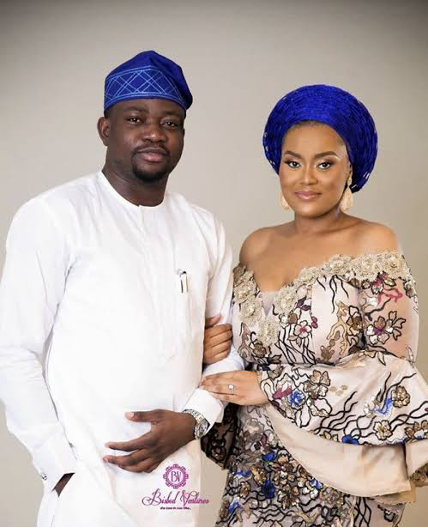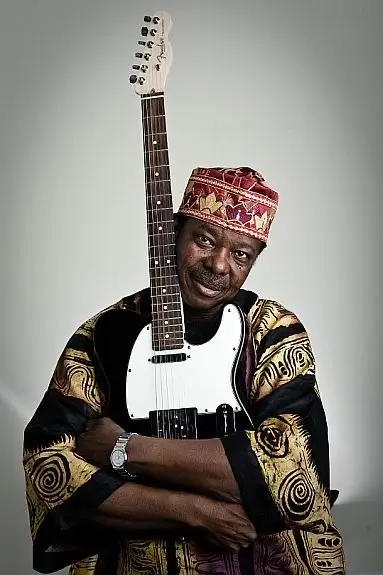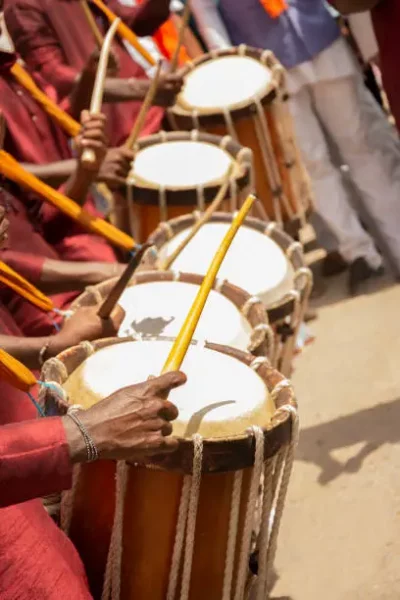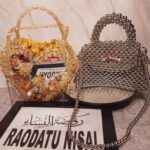DiscoverYoruba.com is your one-stop for embracing Yoruba culture, entertainment, and history unfolding.
Before the arrival of Europeans, the Yoruba people had a unique education system that had been passed down through generations. This system was a lifelong process that involved the entire community, from children to elders. It focused on imparting values, customs, and principles that enabled individuals to live meaningful lives and contribute positively to society.
A key concept in Yoruba education is Ọmọlúwàbí, which represents a person of good character. The goal was to raise well-rounded individuals—morally strong, productive, and community-oriented. This philosophy is summed up in the saying “Ọmọ tí olú ìwà á bí” (“a child born with good character”), which highlights the importance of nurturing responsible and honest adults.
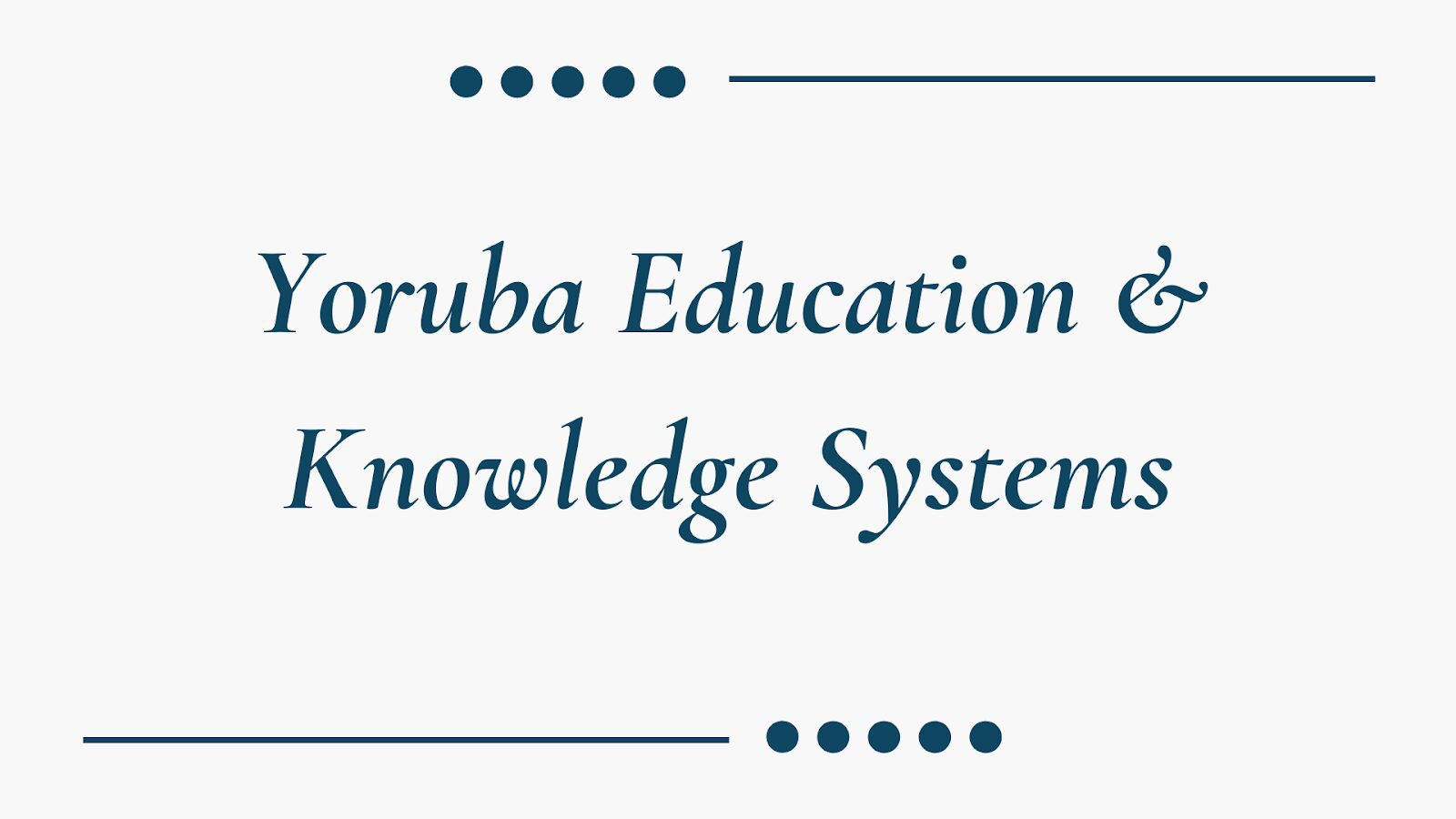
Yoruba Education & Knowledge Systems
The Yoruba education system valued individuality and diversity. There were no failures or dropouts because it was designed to help everyone discover their strengths and paths. The curriculum covered a broad range of subjects, ensuring that individuals were well-prepared for all aspects of life, grounded in Yoruba history and culture.
Education in traditional Yoruba society was integrated into daily life. Families, peer groups, and traditional societies played significant roles in teaching, with lessons often imparted through storytelling, music, festivals, and apprenticeships. Elders and peers guided individuals through adulthood, teaching the deeper philosophies of the community.
Traditional Yoruba Education Systems
In traditional Yoruba society, education was a communal effort. Children learn by actively participating in everyday life, preparing them for adulthood and community contribution.
Holistic Learning Approach
Yoruba education was holistic, focusing on practical skills like farming, cooking, hunting, and craftsmanship and moral values such as respect, cooperation, and peaceful living. These lessons were often taught through proverbs, stories, and cultural practices.
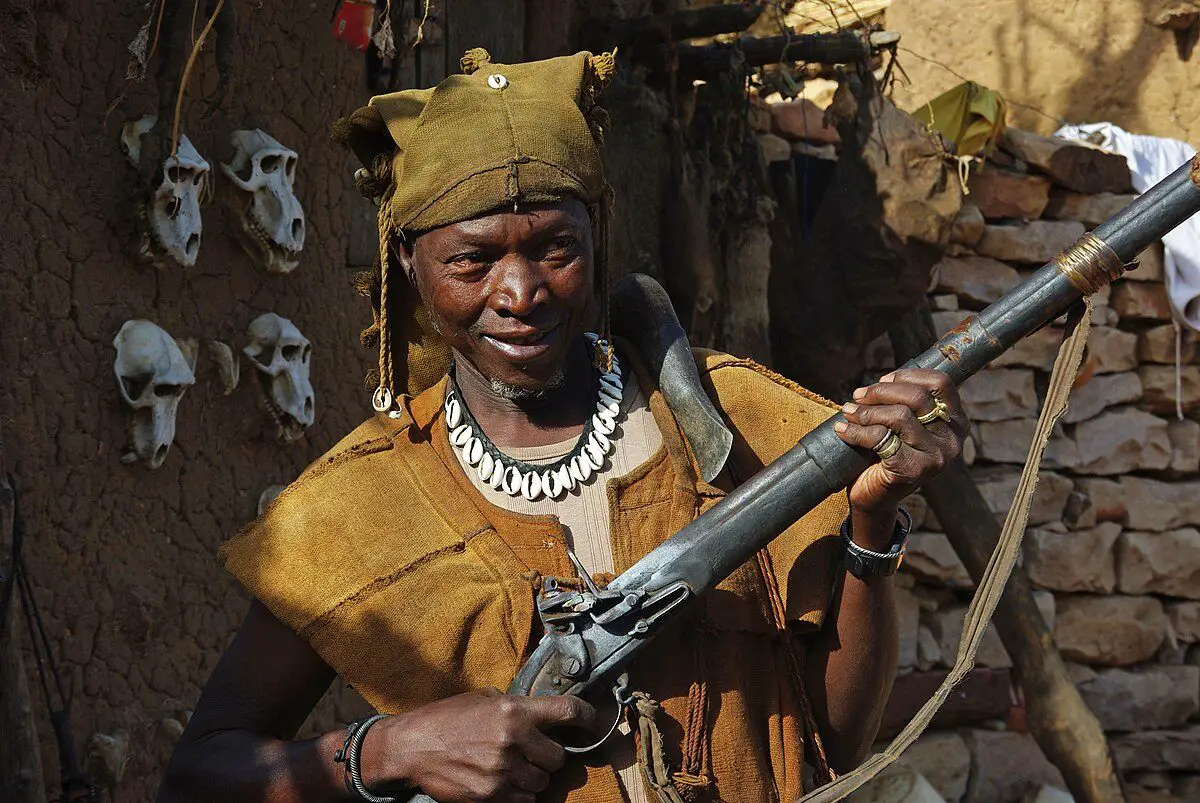
Ọdẹ (Hunter)
Role of the Family
In Yoruba culture, the family is extended, often spanning multiple generations. Elders, particularly the oldest man, were responsible for passing down knowledge and traditions. The family played a vital role in the early stages of education, with children learning the Yoruba language and community values from their parents and extended family members.
Community and Unity
Yoruba children often shared meals from the same bowl, a practice that taught unity, fairness, and mutual support. Cultural activities, such as moonlight stories and riddles, helped children develop life skills and foster a sense of belonging within their community.
Spiritual and Moral Education
Yoruba education blended spiritual teachings with practical knowledge, emphasizing moral uprightness and respect for others. The Yoruba worldview, which sees all things as interconnected, guided individuals to live ethically. Daily greetings, such as “A à jí i ‘re bí?” (“Have we woken up well?”) and “A dúpẹ” (“thank you”), reflect a deep sense of gratitude and respect for life.
The Use of Yoruba Language as a Medium of Education
The Yoruba language has always been central to education in Yoruba-speaking communities. Traditionally, it was used for communication and as the primary language of instruction, especially in the early stages of learning. Teaching a child’s first language is crucial for understanding new concepts, and the National Policy on Education in Nigeria supports the use of local languages, like Yoruba, in schools at the primary level.
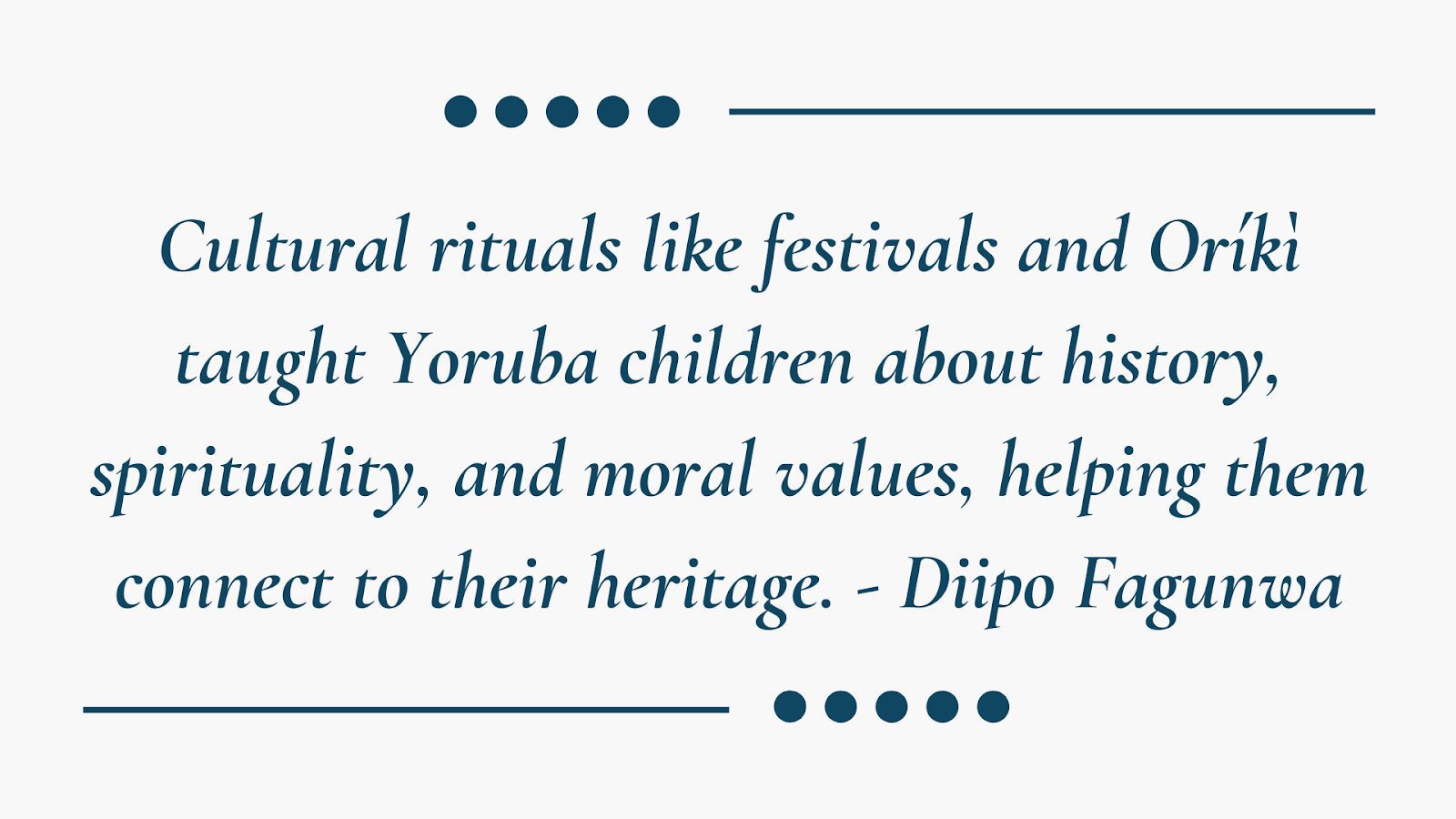
In traditional education, language was closely tied to culture and daily life. Lessons were taught in Yoruba, connecting children to their heritage and values. However, the rise of English as the primary language of instruction in formal schools has diminished the use of Yoruba in education, despite studies showing the benefits of teaching in a child’s native language, particularly in subjects like science and mathematics. This shift reflects a broader global trend, as many countries, including Finland, Sweden, France, Japan, China, Malaysia, Russia, and others, have long recognized the importance of integrating native languages into education systems.
These countries have found that teaching in a child’s first language not only strengthens academic performance but also supports cultural identity and community cohesion. Despite this, the pressure to adopt global languages like English has led to the erosion of indigenous languages in formal schooling in many parts of the world, including Nigeria.
Cultural Education Through Rituals and Ceremonies
Cultural rituals and ceremonies played a significant role in Yoruba education. Festivals, initiations, and sacred ceremonies taught children about Yoruba history, spirituality, and moral values. Oríkì (praise poetry) is one such practice, where children learn about their ancestry, family history, and cultural identity through poetic recitations.
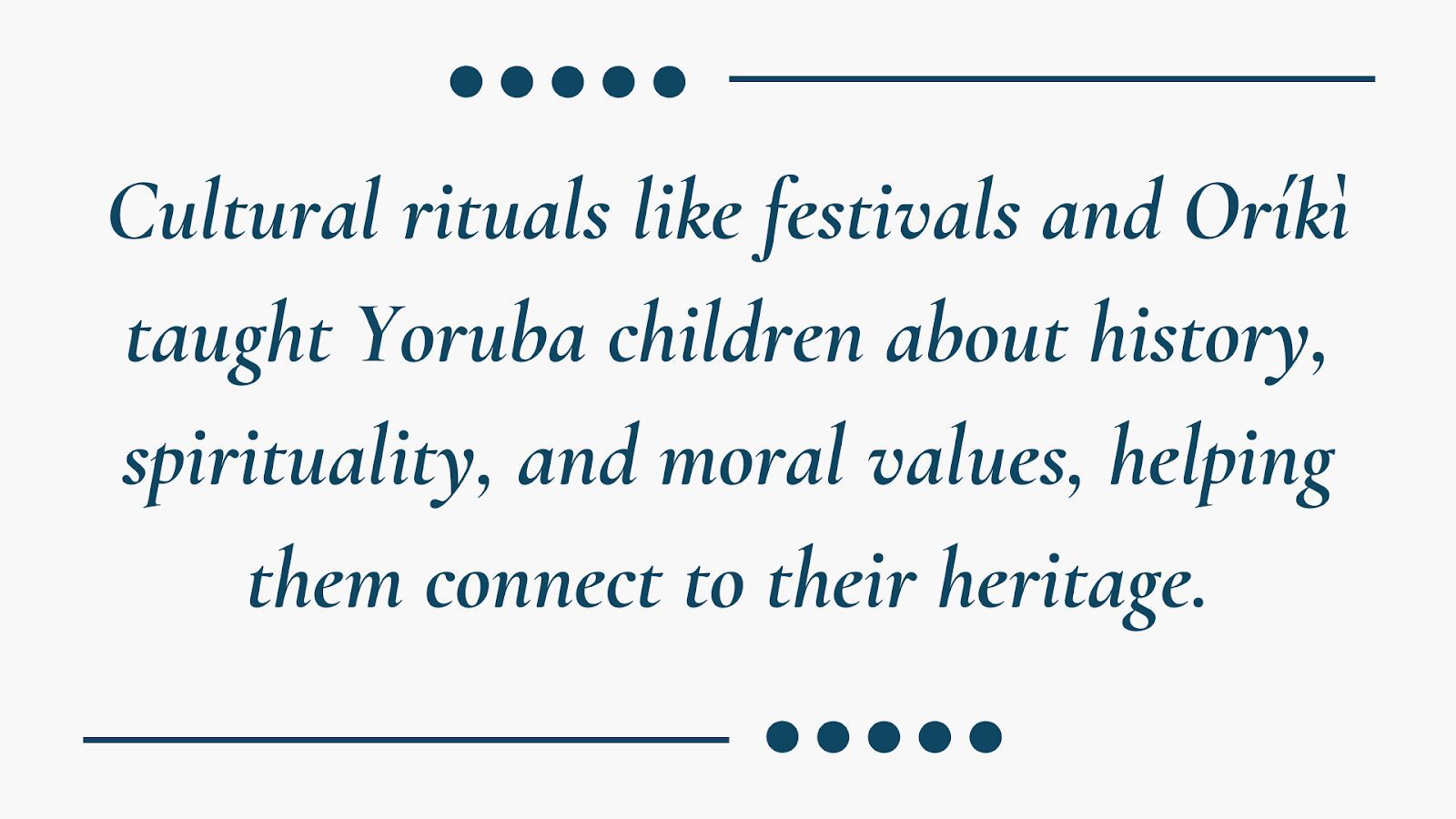
12 Practical Life Values Taught by Yoruba Elders
Yoruba elders emphasize twelve key values integral to personal and societal development:
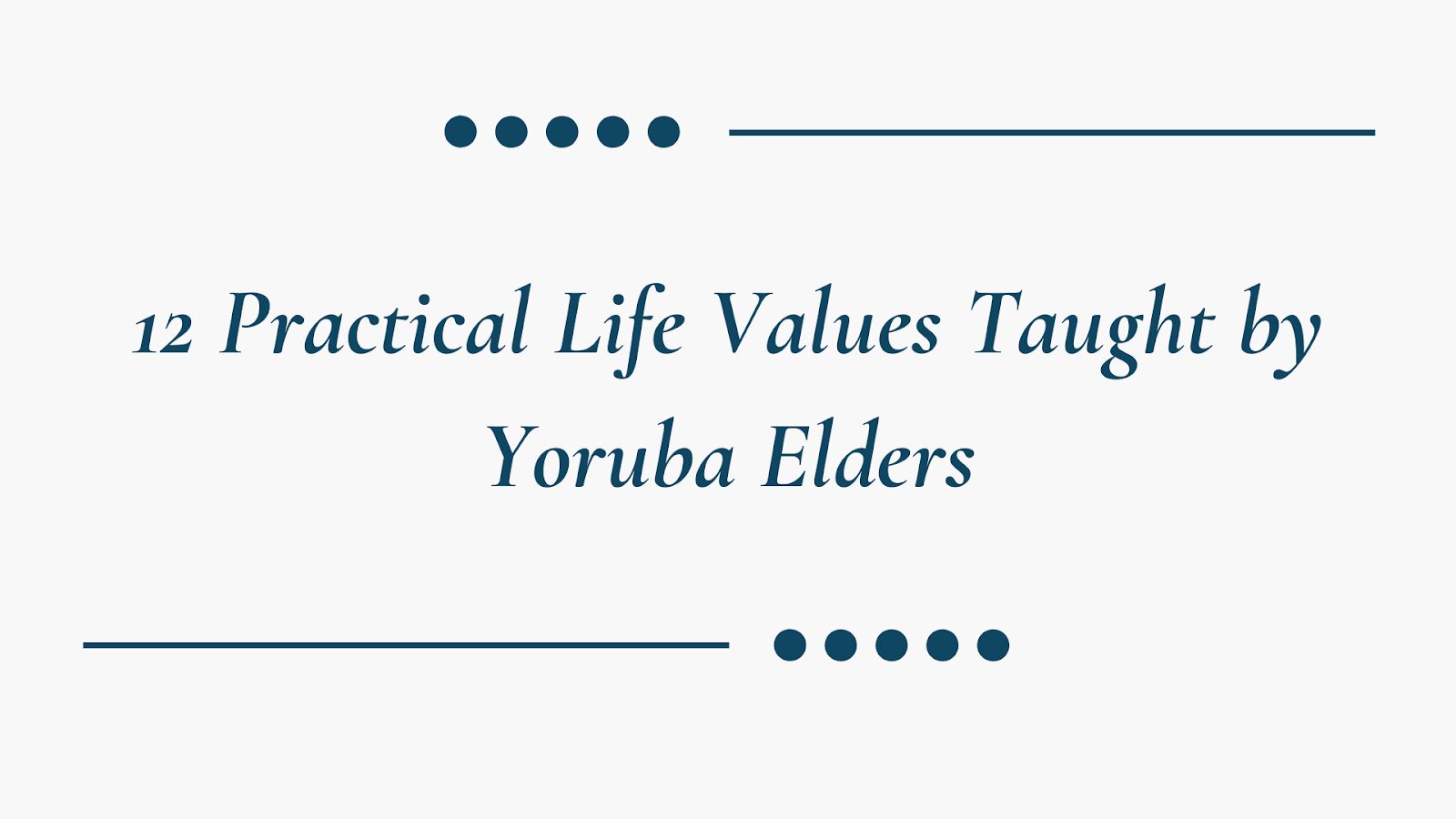
- Imó (Knowledge): The foundation of progress, encouraging acquiring information and learning from experiences.
- Oye (Understanding): The ability to process and apply knowledge, enabling sound decision-making and empathy.
- Ogbon (Wisdom): The practical application of knowledge to navigate life’s challenges.
- Lakaya (Thinkable): Promotes reflection and careful analysis before acting.
- Iwoye (Observation): The importance of attentiveness and learning from experiences.
- Suuru (Patience): Advocates for calm endurance without frustration or haste.
- Itelorun (Contentment): Teaches satisfaction with one’s state, avoiding greed or envy.
- Ifarabale (Carefulness): Encourages caution and mindfulness in actions to prevent mistakes.
- Amumora (Self-Control): Focuses on emotional discipline, especially in difficult situations.
- Amojukuro (Forbearance): Promotes tolerance and enduring discomfort without resentment.
- Aforiti (Perseverance): Highlights persistence despite setbacks.
- Imowon Ara Eni (Self-Worthiness): Instills confidence and a sense of self-respect.
Values Taught Through Traditional Yoruba Education

Yoruba education taught various values, including respect for elders, the environment, and others. Key lessons included:
- Respect for elders and others: Listening to and honoring older people.
- Hard work and responsibility: Valuing effort and dedication in all endeavors.
- Spirit of sharing and cooperation: Emphasizing mutual support.
- Knowledge of family lineage: Understanding and respecting one’s heritage.
- Avoidance of crime and conflict: Encouraging good choices and peaceful conflict resolution.
Modern Yoruba Education Systems
With the arrival of British colonization, Yoruba education underwent significant change. Missionary schools introduced Western-style education, focusing on reading, writing, and scientific subjects. English became the language of instruction, and Western education systems clashed with traditional Yoruba values, particularly the community-centered nature of Yoruba education.
Integration of Yoruba Knowledge in Schools
In recent years, efforts have been made to incorporate Yoruba culture into the modern education system. Schools teach Yoruba language, history, and literature to help preserve cultural heritage while combining traditional and modern knowledge.
Challenges in Modern Yoruba Education
Despite these efforts, challenges persist, including language barriers and access to quality education, especially in rural areas. Additionally, balancing traditional values with modern educational demands remains a significant challenge.
Knowledge Transfer in Yoruba Society
In Yoruba society, knowledge has traditionally been passed down through oral traditions, family teachings, rituals, and formal education. Elders are the primary keepers of this knowledge, using stories, proverbs, and songs to teach younger generations about history, culture, and moral values. Formal education now complements this system, helping to preserve and transmit Yoruba knowledge to future generations.
Frequently Asked Questions (FAQs)
What is the “ìlànà ètò è̩kó̩ ìbílè̩” and why is it important to the Yoruba people?
The “ìlànà ètò è̩kó̩ ìbílè̩” is the traditional education system of the Yoruba people. Although it wasn’t written down, it helped pass on their culture, values, and traditions from one generation to the next. It is important because it teaches young and old people how to live according to their traditions and values using the Yoruba language.
How is the Yoruba education system different from the Western education system?
The Yoruba system focuses on teaching moral values, culture, and the individual’s role in the community. It emphasizes personal development and social responsibility. In contrast, the Western education system focuses more on preparing people for specific jobs and careers, with less emphasis on moral training.
Why do some people say Africans have no literature of their own, and how is this wrong?
Some people wrongly claim that Africans have no literature, but this is based on prejudice and misunderstanding. Scholars like Awólàlú (1979) have shown that African societies, including the Yoruba, have rich oral and written traditions that preserve their history, culture, and knowledge. The Yoruba education system itself is a part of this cultural heritage.
How did the Yoruba education system help in moral development?
The Yoruba education system played a big role in teaching people moral values and social responsibilities. It focused on ensuring individuals understood their family, community, and society duties. This moral education helped build a stable and successful pre-colonial Yoruba society.
Reference
DVV International: Inclusion and diversity in Yorùbá education
Respect in the Yoruba Culture – Welcome To Yorùbá Lessons
The Pre-colonial Yoruba Education System: Catalyst Against Immorality
(PDF) Technological Culture and the Challenge of Erosion of Yorùbá Moral Values

